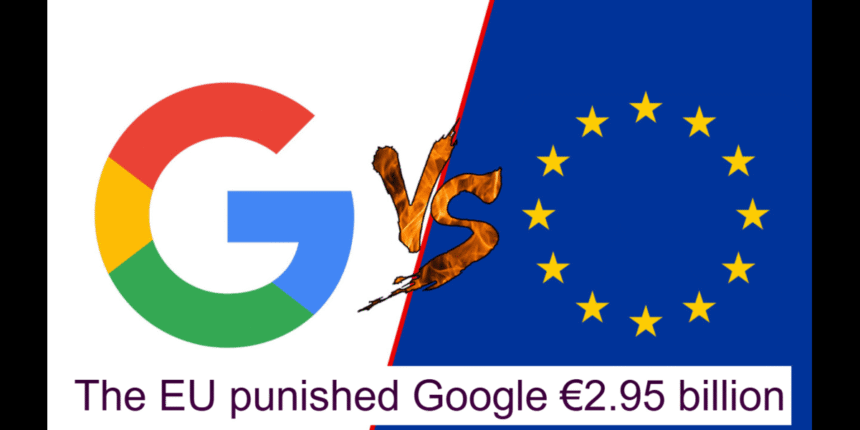EU Fines Google €2.95 Billion for Abusing Dominance: What You Need to Know
The European Union hit Google with a massive €2.95 billion fine. This wasn’t just a big money penalty. It was a huge moment that showed regulators are getting tougher on powerful tech companies. The core accusation was clear: Google misused its strong position in the market.
This case focused on Google Shopping. For years, the European Commission looked closely at how Google ran its business. They wanted to know if Google’s actions hurt competition and limited choices for people shopping online.
The EU’s Case Against Google Shopping
What Was Google Accused Of?
The European Commission found Google used its main search engine power to help its own shopping service. Google Shopping got a clear advantage over others. Google purposely put its own comparison shopping service higher in search results. At the same time, it pushed down rival services.
This meant people often saw Google’s shopping ads first. Other shopping sites got much less attention. The Commission saw this as unfair play.
The €2.95 Billion Penalty and its Context
The EU issued this fine on June 27, 2017. The exact amount was €2,950,000,000. To understand how big this was, consider it represented 1.29% of Google’s total money made in 2016. It was one of the largest fines for unfair business practices the EU had ever given out. This penalty also marked the biggest fine Google had faced at the time.
Timeline of the Investigation
The European Commission started its formal investigation into Google Shopping back in November 2010. They spent years gathering facts and talking to many companies. This long process showed how carefully the EU looked at every detail. The Commission sent statements of objection to Google in 2015 and 2016. These detailed their concerns before the final decision came down in 2017.
US President Donald Trump also attacked the decision, saying in a post on social media it was “very unfair” and threatening to launch an investigation over European tech practices that could lead to tariffs.
Impact on Google and the Market
Google’s Initial Response and Appeals
Google did not agree with the EU’s decision. They argued that their shopping service helped users and competed fairly. Google quickly started legal challenges against the fine. They took their case to the EU’s General Court. While Google lost this appeal in 2021, the legal fights highlight how complex these issues are.
Changes Implemented by Google
To follow the EU’s order, Google had to change how it showed shopping results. The ruling made Google display rival shopping services more fairly. Now, when you searched for a product, Google had to show other comparison sites next to its own. This let users choose where to look for deals. It was a small but important change for how Google runs its search engine.
Broader Market Effects and Competition
Did this fine really make things fairer in online shopping and ads? Many market watchers say the impact was mixed. Some argue it did little to truly change Google’s deep market hold. Others point out it at least opened the door for more competition. Still, Google’s place at the top remains very strong.
Broader Implications for Tech Regulation
The EU’s Role as a Digital Enforcer
This fine showed the EU is serious about making big tech companies play by the rules. It proved Europe acts as a major police force in the world of online business. This case also paved the way for newer rules. Think of the Digital Markets Act (DMA). It aims to stop tech giants from harming competition even before it starts.
Global Regulatory Trends
The EU’s action against Google wasn’t alone. It was part of a bigger global shift. Many other countries watched the EU’s move closely. Some places, like India and the United States, also looked into Google’s business practices. The EU case gave them a playbook for their own investigations. This created a wider trend of governments keeping a closer eye on big tech.
Consumer Choice and Data Privacy
This antitrust ruling means good things for shoppers. When companies compete fairly, you get more choices and often better prices. Without fair rules, one company can make all the decisions. This also touches on your data. When companies control too much, they also control more of your information. So, what can you do? Actively search for different comparison shopping sites. Don’t just rely on what Google shows you first.
Lessons Learned and Future Outlook
Lessons for Dominant Tech Companies
Companies like Google got a clear message: fair play matters. This penalty showed that using your market power to crush rivals won’t be ignored. It’s a reminder for all big players to follow antitrust laws. Treating competitors fairly isn’t just a nice idea; it’s a legal requirement. Avoiding self-preference is key to staying out of trouble.
The Future of Antitrust in the Digital Age
Stopping unfair practices in the online world is always changing. Regulators face new challenges as technology moves fast. They’re now looking at things like AI and cloud computing. What’s next for antitrust? We might see more rules about how data is used. Authorities will keep working to keep the internet a place where everyone can compete.
Conclusion
The €2.95 billion fine against Google was a big moment. It sent a strong warning that tech giants must play fair. Google had used its search dominance to push its own services, hurting competition. This ruling helped give shoppers more choices, even if only a little. It also solidified the EU’s role in guiding how the online world works. Staying watchful and having strong rules will always be needed for a fair digital market.

